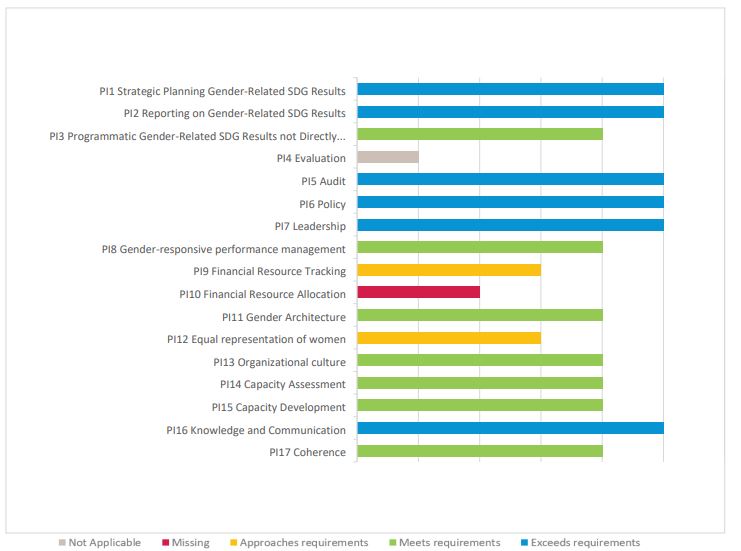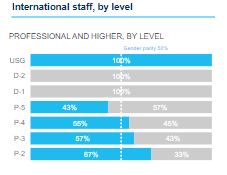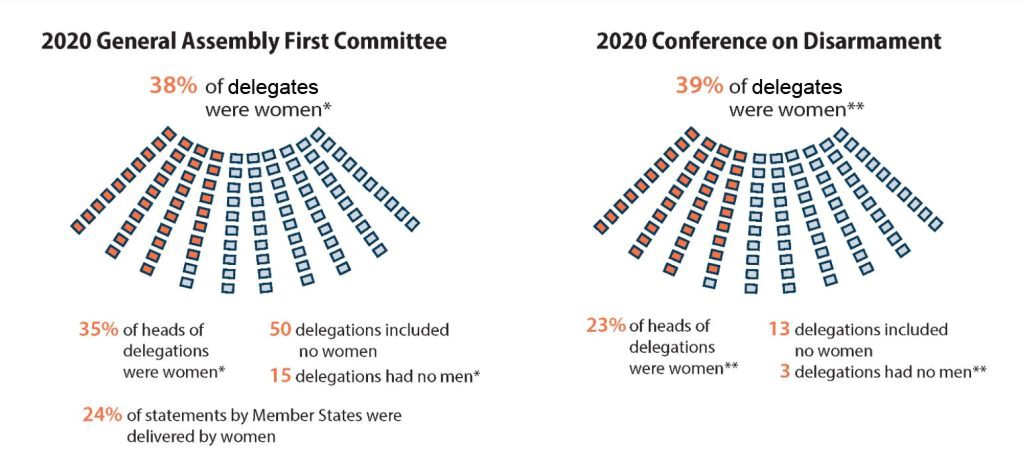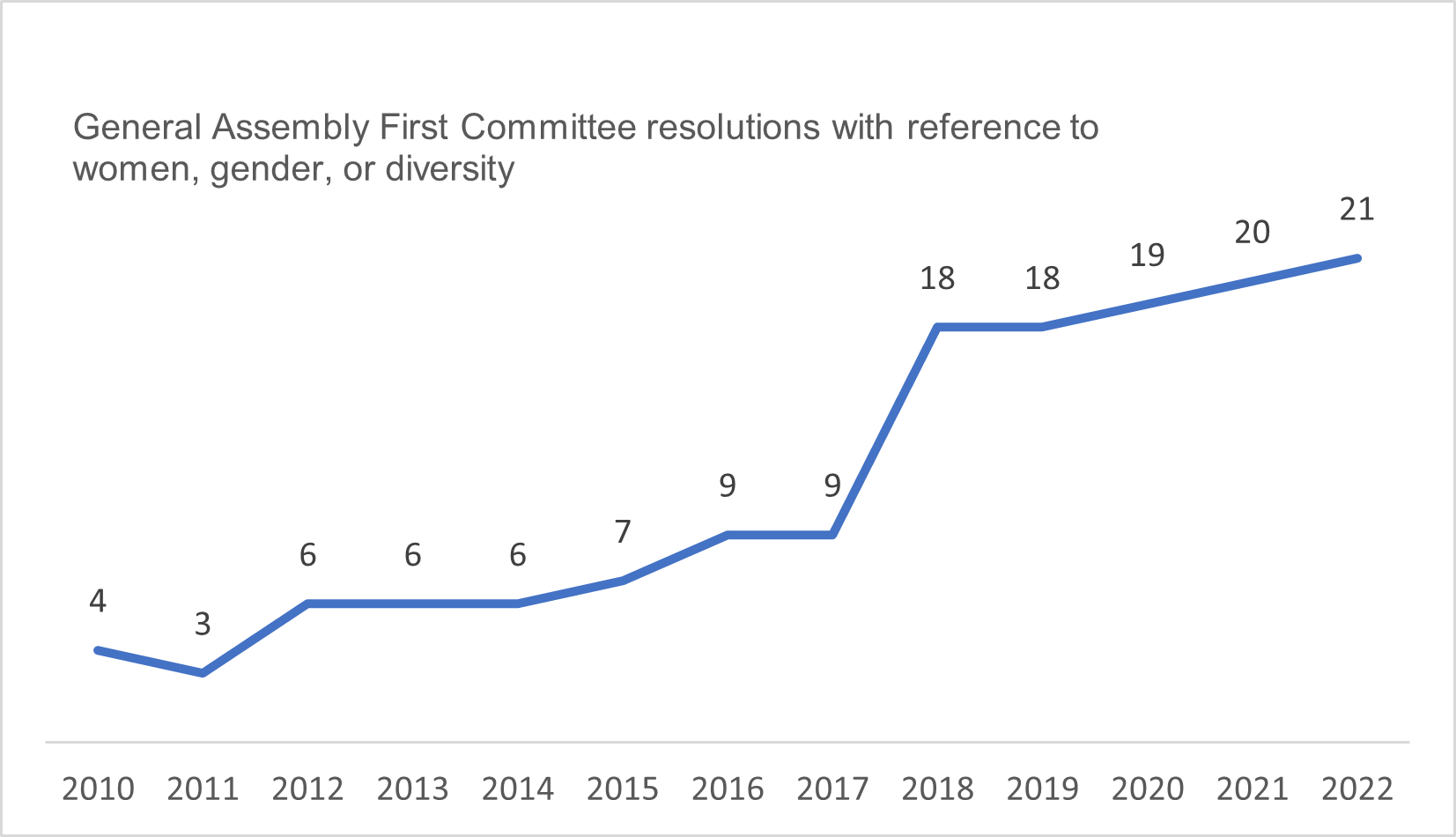People are differently involved in and impacted by weapons, armed conflict and security based on their gender and other factors. Analyzing disarmament processes and policies through a gender lens casts them in a new light and suggest more effective and sustainable solutions.
In 2000, the Security Council adopted the first resolution on women, peace and security (WPS) acknowledging the disproportionate and unique impact of armed conflict on women and girls and calling for women’s full involvement in all peace and security efforts. The General Assembly, in its resolution 65/69 (2010) and subsequent resolutions on women, disarmament, non-proliferation and arms control, also encourages better understanding of the gendered impact of armed conflict and calls for equal opportunities and increase in the participation of women in disarmament decision-making.
Nevertheless, women remain underrepresented and make up only approximately one third of participants in multilateral disarmament meetings; even fewer are heads of delegations.
Moreover, disarmament is central for achieving global gender equality, which has been affirmed in the Convention on the Elimination of Discrimination against Women in 1979 and in the 1995 landmark Beijing Declaration and Platform for Action on women’s rights. Linking disarmament and efforts for gender equality is also key for achieving the Sustainable Development Goals by 2030, including goal 5 on gender equality.
UNODA Gender policy
The UN Office for Disarmament Affairs (UNODA) Gender Policy provides a framework for the Office facilitate progress on gender-responsive disarmament, arms control and non-proliferation and contribute to gender equality and elimination of gender-based violence. The Policy outlines the roles and responsibilities of all UNODA personnel at all duty stations and seeks to provide them with common commitments and priorities for gender-responsive programmes, initiatives and institutional practices. The Policy aims to:
- Enhance diversity and enhance gender parity and women’s equal, full and effective participation and leadership in disarmament and arms control bodies and discussions.
- Advocacy and build capacities for gender perspectives in all areas of disarmament and arms control and integration of disarmament in gender equality and WPS frameworks
- Strengthen UNODA’s internal capacity for gender analysis and gender mainstreaming
UN accountability framework on gender mainstreaming
UNODA reports annually on the United Nations accountability framework for gender mainstreaming – the UN-SWAP. The framework consists of seventeen performance indicators based on intergovernmental mandates. uses a five-point rating scale ranging from “not applicable” to “exceeds requirements” for every indicator. This allows progress to be defined uniformly, measured progressively, and articulated aspirationally.
UNODA UN-SWAP Report Card 2020Download
UNODA results UN-SWAP 2021

Gender parity in UNODA

UNODA implements the UN Strategy on Gender Parity to achieve parity for all UN staff by the year 2028. UNODA set its own targets and implement Temporary Special Measures and report according to ST/AI/2020/5 in combnation with inclusive recruitment practices, targeted talent management, and to create an inclusive and empowering work environment in line with UN Enabling Environment Guidelines. UNODA is committed to not only achieving gender parity, but fostering a more diverse workforce and inclusive culture.
un secreteriat gender parity dashboard
Gender Balance in Disarmament Meetings
Women remain underrepresented in arms control, non-proliferation and disarmament processes and diplomacy. Women make up only one third of participants in larger meetings and only about one fifth in smaller forums with fewer than 100 participants. Gender equality is a fundamental human right, and failing to involve women undermines their right to participate in shaping policies applicable to all. There is also wide recognition that equal, full and effective participation of women and men is vital to the maintenance of sustainable peace and security. Diverse partnerships and inclusive decision-making are catalysts for more effective and sustainable action.

** Out of a total of 64 delegations. Source: Conference on Disarmament list of participants (CD/INF.79/Rev.2)
- UNIDIR, Still Behind the Curve 2019
- UN, Secretary General Disarmament Agenda Actions 36 and 37 (2018) on women’s equal participation disarmament and arms control
- UNLIREC, Forces for Change IV (2020) on the role of women in disarmament, non-proliferation and arms control in the Latin American and Caribbean region.
- UNIDIR, Gender in Cyber Diplomacy
Women, Peace and Security and Disarmament
Security Council resolution 1325 (2000) and subsequent resolutions on women and peace and security (WPS), acknowledge the differentiated impact of armed conflict on women and that women’s participation is vital to broader objectives for international peace and security. Disarmament and arms control intersect with all four pillars of the WPS agenda on participation, protection, prevention, and relief and recovery.
In the 2021 annual open debate in the Security Council on WPS, ten Member States and groups that addressed the Council mentioned disarmament or reductions in military spending – four of them current Security Council Members. In the 2020 Open Debate, three of the 15 Council Members mentioned disarmament and arms control, compared to two in 2019 and none in 2018 and 2017 respectively.
The UN Office for Disarmament Affairs is a members of the UN standing committee on WPS.
National Action Plans
According to Women’s International League for Peace and Freedom, 98 UN Member States (51 percent) have adopted a National Action Plan on WPS, and 31 current action plans (32 percent) include references to and specific actions towards disarmament.
Military expenditures
In the 2020 report on WPS to the Security Council, the UN Secretary-General (SG) identified disarmament and reduction of excessive military expenditures as one of five key goals for the next decade of WPS action. In 2021, the SG report on WPS had a thematic focus on military spending and recommends advocacy for people-centered policies with a view to encouraging greater investment in the social and human security.
The Beijing Declaration (1995) includes military spending as a key area of action to enhance social development and gender equality. The Generation Equality Compact on Women, Peace and Security (2021) invites States, academia, civil society to sign on to the compact action on military’s expenditures, as well as States to ratify the Arms Trade Treaty.
- UNIDIR study Connection the Dots on WPS, arms control and disarmament (2020)
- Opinion Piece by Izumi Nakamitsu, High Representative for Disarmament Affairs and H.E. Amb. Selma Ashipala-Musavyi, former Chair of the UN Secretary General’s Advisory Board on Disarmament Matters, Women around the globe share an immense stake in ending armed violence (2020)
- Opinion piece by Izumi Nakamitsu, High Representative for Disarmament Affairs and Phumzile Mlambo-Ngcuka, former Executive Director of UN Women, For a safer and more resilient world, put people before runaway military spending (2021)
- UNODA Occasional Paper 35 (2020) chapter on “A feminist approach for addressing excessive military spending” by Ray Acheson and Madeleine Reesm on the link between gender, militarism and unconstrained military spending.
Gender in Disarmament Resolutions and Treaties
Disarmament and arms control treaties addressing gender
Three multilateral arms control treaties that have been signed since 1945 have gender provisions:
The Arms Trade Treaty (2013)
The Treaty on the Prohibition of Nuclear Weapons (2017)
The Convention on Cluster Munitions (2018)
General Assembly First Committee resolutions addressing gender
General Assembly (GA) resolution 65/69 (2010) and subsequent resolutions on Women, disarmament, non-proliferation and arms control recognize the need to facilitate and increase the participation of women in disarmament and promote equal opportunities in decision-making. These resolutions also encourage better understanding of the gendered impact of armed conflict.
The number of other GA First Committee resolutions on disarmament that incorporate gender references has increased from three resolutions in 2010 to nineteen resolutions adopted in 2021 that included language on women or gender covering numerous areas including nuclear weapons, biological weapons, cluster munitions, ammunition stockpiles, small arms and light weapons (SALW), regional disarmament, and youth.
Some resolutions address substantive gender perspectives such as the differentiated impact of weapons or gender analysis of the issues addressed by the resolution. More common is that the resolution refer to the equal participation of women and men in decision-making or other processes.

Newsfeed
2024
July 2024
2023
November 2023
October 2023
September 2023
August 2023
https://platform.twitter.com/embed/Tweet.html?dnt=true&embedId=twitter-widget-1&features=eyJ0ZndfdGltZWxpbmVfbGlzdCI6eyJidWNrZXQiOltdLCJ2ZXJzaW9uIjpudWxsfSwidGZ3X2ZvbGxvd2VyX2NvdW50X3N1bnNldCI6eyJidWNrZXQiOnRydWUsInZlcnNpb24iOm51bGx9LCJ0ZndfdHdlZXRfZWRpdF9iYWNrZW5kIjp7ImJ1Y2tldCI6Im9uIiwidmVyc2lvbiI6bnVsbH0sInRmd19yZWZzcmNfc2Vzc2lvbiI6eyJidWNrZXQiOiJvbiIsInZlcnNpb24iOm51bGx9LCJ0ZndfZm9zbnJfc29mdF9pbnRlcnZlbnRpb25zX2VuYWJsZWQiOnsiYnVja2V0Ijoib24iLCJ2ZXJzaW9uIjpudWxsfSwidGZ3X21peGVkX21lZGlhXzE1ODk3Ijp7ImJ1Y2tldCI6InRyZWF0bWVudCIsInZlcnNpb24iOm51bGx9LCJ0ZndfZXhwZXJpbWVudHNfY29va2llX2V4cGlyYXRpb24iOnsiYnVja2V0IjoxMjA5NjAwLCJ2ZXJzaW9uIjpudWxsfSwidGZ3X3Nob3dfYmlyZHdhdGNoX3Bpdm90c19lbmFibGVkIjp7ImJ1Y2tldCI6Im9uIiwidmVyc2lvbiI6bnVsbH0sInRmd19kdXBsaWNhdGVfc2NyaWJlc190b19zZXR0aW5ncyI6eyJidWNrZXQiOiJvbiIsInZlcnNpb24iOm51bGx9LCJ0ZndfdXNlX3Byb2ZpbGVfaW1hZ2Vfc2hhcGVfZW5hYmxlZCI6eyJidWNrZXQiOiJvbiIsInZlcnNpb24iOm51bGx9LCJ0ZndfdmlkZW9faGxzX2R5bmFtaWNfbWFuaWZlc3RzXzE1MDgyIjp7ImJ1Y2tldCI6InRydWVfYml0cmF0ZSIsInZlcnNpb24iOm51bGx9LCJ0ZndfbGVnYWN5X3RpbWVsaW5lX3N1bnNldCI6eyJidWNrZXQiOnRydWUsInZlcnNpb24iOm51bGx9LCJ0ZndfdHdlZXRfZWRpdF9mcm9udGVuZCI6eyJidWNrZXQiOiJvbiIsInZlcnNpb24iOm51bGx9fQ%3D%3D&frame=false&hideCard=false&hideThread=false&id=1671530500366770185&lang=en&origin=https%3A%2F%2Fdisarmament.unoda.org%2Ftopics%2Fgender%2F&sessionId=b5cbf531ac253d0b7f9172bcb8507460a2067cb6&theme=light&widgetsVersion=2615f7e52b7e0%3A1702314776716&width=550px
June 2023
https://platform.twitter.com/embed/Tweet.html?dnt=true&embedId=twitter-widget-2&features=eyJ0ZndfdGltZWxpbmVfbGlzdCI6eyJidWNrZXQiOltdLCJ2ZXJzaW9uIjpudWxsfSwidGZ3X2ZvbGxvd2VyX2NvdW50X3N1bnNldCI6eyJidWNrZXQiOnRydWUsInZlcnNpb24iOm51bGx9LCJ0ZndfdHdlZXRfZWRpdF9iYWNrZW5kIjp7ImJ1Y2tldCI6Im9uIiwidmVyc2lvbiI6bnVsbH0sInRmd19yZWZzcmNfc2Vzc2lvbiI6eyJidWNrZXQiOiJvbiIsInZlcnNpb24iOm51bGx9LCJ0ZndfZm9zbnJfc29mdF9pbnRlcnZlbnRpb25zX2VuYWJsZWQiOnsiYnVja2V0Ijoib24iLCJ2ZXJzaW9uIjpudWxsfSwidGZ3X21peGVkX21lZGlhXzE1ODk3Ijp7ImJ1Y2tldCI6InRyZWF0bWVudCIsInZlcnNpb24iOm51bGx9LCJ0ZndfZXhwZXJpbWVudHNfY29va2llX2V4cGlyYXRpb24iOnsiYnVja2V0IjoxMjA5NjAwLCJ2ZXJzaW9uIjpudWxsfSwidGZ3X3Nob3dfYmlyZHdhdGNoX3Bpdm90c19lbmFibGVkIjp7ImJ1Y2tldCI6Im9uIiwidmVyc2lvbiI6bnVsbH0sInRmd19kdXBsaWNhdGVfc2NyaWJlc190b19zZXR0aW5ncyI6eyJidWNrZXQiOiJvbiIsInZlcnNpb24iOm51bGx9LCJ0ZndfdXNlX3Byb2ZpbGVfaW1hZ2Vfc2hhcGVfZW5hYmxlZCI6eyJidWNrZXQiOiJvbiIsInZlcnNpb24iOm51bGx9LCJ0ZndfdmlkZW9faGxzX2R5bmFtaWNfbWFuaWZlc3RzXzE1MDgyIjp7ImJ1Y2tldCI6InRydWVfYml0cmF0ZSIsInZlcnNpb24iOm51bGx9LCJ0ZndfbGVnYWN5X3RpbWVsaW5lX3N1bnNldCI6eyJidWNrZXQiOnRydWUsInZlcnNpb24iOm51bGx9LCJ0ZndfdHdlZXRfZWRpdF9mcm9udGVuZCI6eyJidWNrZXQiOiJvbiIsInZlcnNpb24iOm51bGx9fQ%3D%3D&frame=false&hideCard=false&hideThread=false&id=1673949705485574144&lang=en&origin=https%3A%2F%2Fdisarmament.unoda.org%2Ftopics%2Fgender%2F&sessionId=b5cbf531ac253d0b7f9172bcb8507460a2067cb6&theme=light&widgetsVersion=2615f7e52b7e0%3A1702314776716&width=550px
May 2023
March 2023
UNODA launches a new course on “Gender-Mainstreaming Small Arms Control”
Izumi Nakamitsu keynote address at the Nikkei’s International Women’s Day Symposium
International Women’s Day: the many women contributing to a more secure and peaceful cyberspace
February 2022
Women experts discuss meaningful participation in ammunition management
2022
December 2022
November 2022
Watch recording of above event here
High Representative for Disarmament Affairs calls for greater gender diversity, analysis and equality in biosecurity and disarmament
HRs Remarks at Opening of Photo Exhibit “Women Making the World Safe from Biological and Toxic Weapons 50 Years of the BWC”
New Publication: Training Manual on Gender-Mainstreaming Small Arms Control
October 2022
September 2022
August 2022
Join the #NPTdiversity social media campaign
June 2022
May 2022
April 2022
Lao PDR holds workshop to enhance gender responsive small arms control
March 2022
Youth4Disarmament’s #Leaders4Tomorrow hold workshop on D.N.A. and Gender
High Representative for Disarmament Affairs’ video message on International Women’s Day 2022
January 2022
2021
10 December 2021
UNODA participates in 16 Days of Activism Against Gender-Based Violence Campaign
25 November 2021
ODA launches 16 Days of Activism Against Gender-Based Violence Campaign
2 November 2021
First Committee side event on women’s participation in international security
1 November 2021
1 November 2021
28 October 2021
26 October 2021
18 October 2021
18 October 2021
26 August 2021
2 August 2021
29 July 2021
UNRCPD hosts webinar series on gender in small arms control for Cambodian officials
7 July 2021
UNODA concludes training series on gender and small arms control
2 July 2021
UNODA becomes signatory to Women, Peace & Security and Humanitarian Action (WPS-HA) Compact
28 June 2021
25 June 2021
HR’s video message for women in cyber policy panel during 3rd inter-regional conference on Cyber/ICT
27 May 2021
New tool to track gender-responsive small arms control in the DRC
6 May 2021
ODA and UN Women principals outline steps to reshape security and rethink military spending (op-ed)
21 April 2021
Nuclear-arms-control experts push to bring gender equality to their work
14 April 2021
1 April 2021
8 March 2021
HR addresses the National Diet of Japan on International Women’s Day
8 March 2021
8 March 2021
Video message by High Representative on International Women’s Day
26 February 2021
Young people weigh what makes women crucial to disarmament with UNRCPD
7 January 2021
UNREC kick-starts cooperation on gender and small arms control with the Democratic Republic of Congo
2020
2020
18 December 2020
8 December 2020
HR delivers opening remarks at symposium on Women, Disarmament, Non-proliferation and Arms Control in Latin America and the Caribbean
3 December 2020
High Representative discusses women in disarmament with the European Leadership Network
17 December 2020
UNODA joins global efforts for 16 Days of Activism Against Gender-Based Violence
27 November 2020
17 November 2020
6 November 2020
27 October 2020
27 October 2020
YouthChampions4Disarmament discuss the role of gender in disarmament
9 October 2020
UNRCPD discusses gender and disarmament with students at virtual webinar
24 June 2020
HR remarks at “UN 2020: Enhancing peace, disarmament & the role of women” Virtual Event
1 May 2020
UNRCPD completes training on role of gender in small arms control
12 March 2020
International Women’s Day: the HR’s take on women in disarmament (video)
6 February 2020
High Rep Nakamitsu speaks to Women in International Security and Cyberspace Fellowship
2019
Coming soon
Further resources
Gender and Disarmament Training and Resources
- UNODA, Course Gender Perspectives on Disarmament
- UNODA, Course on Gender Mainstreaming Small Arms Control
- UN Women Training, Gender and Disarmament
- UNODA, Fact Sheet on Gender and Disarmament
- UNODA, Disarmament Yearbook Gender Chapter (2020)
- IGC, Gender & Disarmament Resource Pack
- Reaching Critical Will, Gender and Disarmament Database
- UNIDIR, Gender Programme
- UNODA Youth Champion, Intersectional Guide to Disarmament
Gender and Conventional Weapons
- UNODA, Gender and Small Arms and Light Weapons (website)
- UNODA, Gender Perspectives on small arms
- UNODA, Gender and Ammunition Management
- UNDP SEESAC, Gender Analysis Guidelines of Small Arms
- UNMAS, Gender and Mine Action
- UNODA, Gender and Land Mines
- UNIDIR, Gender in the Anti-Personnel Mine Ban Convention
- UNODA, Gender and DDR
Gender and Weapons of Mass Destruction
- UNIDIR, Gender and Chemical Weapons
- UNIDIR, Gender and Chemical and Biological Weapons
- UNIDIR, Gender and Nuclear Weapons
- ICAN, Gender and Nuclear Weapons
- UNODA, Gender and Weapons of Mass Destruction
Gender-Based Violence
- UNLIREC, Preventing violence against women through arms control in Latin America and the Caribbean: Recommendations during the COVID-19 crisis
Other
General Assembly resolutions
“Women, disarmament, non-proliferation and arms control”
- A/RES77/55 (2022)
- A/RES/75/48 (2020)
- A/RES/73/46 (2018)
- A/RES/72/46 (2017)
- A/RES/71/56 (2016)
- A/RES/69/61 (2014)
- A/RES/68/33 (2013)
- A/RES/67/48 (2012)
- A/RES/65/69 (2010)